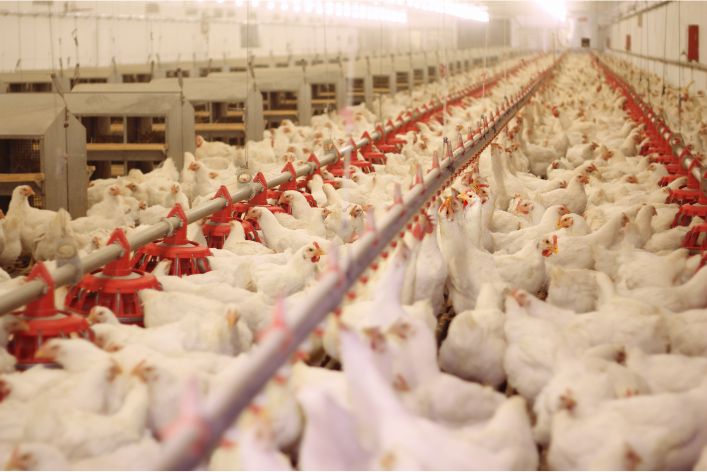
Poultry farming is a profitable and sustainable business that has been practiced for centuries. The demand for poultry products such as chicken and eggs has continued to grow, making it an attractive business venture for many entrepreneurs.
However, starting a profitable poultry business requires careful planning, preparation, and management. In this article, we will explore the essential steps involved in starting a successful poultry business.
From conducting market research, choosing the right type of poultry, finding a suitable location, and creating a business plan to setting up the poultry farm, managing the business, and overcoming challenges, we will provide valuable insights and tips for anyone interested in starting a profitable poultry business.
Whether you are a first-time entrepreneur or an experienced farmer looking to expand your business, this article will equip you with the knowledge and skills needed to build a profitable poultry business that can thrive in today’s competitive market.
Preparing for the Poultry Business
Before starting a poultry business, there are crucial factors that need to be considered to increase the chances of success. These include conducting market research, selecting the appropriate type of poultry, choosing a suitable location, and securing funding. In this section, we will delve into these essential aspects to help you prepare adequately before starting your poultry business.
1. Market Research for Preparing
Market research is a critical step when preparing to start a poultry business. It involves gathering and analyzing information about the poultry industry, including consumer demand, competition, pricing, and trends. Conducting market research will help you determine the viability of your business idea and identify potential challenges and opportunities.
For instance, you will need to understand the demand for poultry products in your target market and identify any gaps that your business can fill. This will help you decide on the type of poultry to rear, the production volume, and the pricing strategy.
Additionally, market research will enable you to learn from your competitors’ strengths and weaknesses, helping you develop a competitive advantage. Ultimately, conducting thorough market research will help you make informed decisions that will increase the likelihood of success for your poultry business.
2. Choosing the Type of Poultry
Choosing the right type of poultry for your business is crucial to ensuring that you meet your target market’s needs and maximize profits. When selecting the type of poultry to rear, consider factors such as demand, cost, and management requirements.
Popular options include chicken, turkey, duck, quail, and geese. Chickens are the most common type of poultry and are preferred for their meat and egg production.
Turkeys are typically reared for meat and are often in demand during the holiday season. Ducks are popular for their eggs and meat, while quails are mainly reared for their meat.
Geese are often reared for their meat and are known to be efficient grazers. When choosing the type of poultry to rear, consider the local demand, the availability of feed, and the climate in your area.
It is also essential to consider the production costs and potential profits to ensure that the chosen type of poultry is financially viable.
3. Finding a Suitable Location
The location you choose will impact your business’s success and profitability, so it is crucial to choose wisely. The location you choose will impact your business’s success and profitability, so it is crucial to choose wisely.
When looking for a location, consider factors such as accessibility, availability of utilities, zoning regulations, and proximity to markets and suppliers. Access to water, electricity, and other utilities is vital for the operation of the poultry farm.
Innovative Tech Solutions, Tailored for You
Our leading tech firm crafts custom software, web & mobile apps, designed with your unique needs in mind. Elevate your business with cutting-edge solutions no one else can offer.
Start NowZoning regulations determine where you can locate the farm, and you must ensure that the chosen location complies with the relevant regulations. Proximity to markets and suppliers is also crucial as it affects transportation costs and availability of inputs.
Additionally, consider the climate, topography, and soil quality, as they affect the health and growth of the poultry. Choosing a suitable location will not only ensure your poultry farm’s viability but also help you minimize operational costs, increase efficiency, and maximize profitability.
4. Creating a Business Plan
Creating a business plan is crucial when preparing to start a poultry business. A business plan is a written document that outlines the objectives, strategies, and financial projections of the business.
It serves as a roadmap for the business and helps you make informed decisions. When creating a business plan, include information on the type of poultry, production volume, pricing strategy, marketing plan, management structure, and financial projections.
The business plan should also consider potential risks and challenges and include contingency plans. Financial projections should cover expenses, revenue, and profits for the first few years of operation.
A well-crafted business plan can help you secure funding, attract investors, and guide your business’s growth. It is important to regularly review and update the business plan as your business grows and changes to ensure that you stay on track to achieving your goals.
5. Funding the Business
Funding is an essential aspect of preparing to start a poultry business. Depending on the scale of the business, you may require significant investment to purchase land, equipment, and livestock, among other expenses.
Before seeking funding, ensure that you have a well-crafted business plan and financial projections that demonstrate the viability of the business. You can fund the business through personal savings, loans, grants, or equity financing.
Personal savings are a good option if you have sufficient funds to cover startup costs. Loans are another option, but ensure that you have a repayment plan and consider the interest rates and collateral requirements.
Grants are available from government agencies, NGOs, and other organizations, but they are often competitive and have strict eligibility criteria. Equity financing involves selling a portion of the business to investors in exchange for funding. Regardless of the funding source, ensure that you have a solid plan for managing cash flow and repaying any debt.
Setting Up the Poultry Farm
Setting up a poultry farm is one of the most crucial steps in starting a profitable poultry business. The design and layout of the farm should provide a comfortable environment for the birds, ensure ease of management, and optimize production.
When setting up the farm, the first consideration should be the type of poultry you plan to rear. The type of poultry you choose will determine the housing requirements, feeding program, and other management practices. For example, chickens require a more controlled environment compared to ducks, which are harder and can tolerate harsher conditions.
The second consideration is the expected production volume. You will need to determine the number of birds you plan to keep and the amount of space and resources required to support the desired production volume. The farm should have adequate space for the birds to move around, access to clean water, and sufficient ventilation to maintain the right temperature and humidity levels.
Next, consider the climate and topography of the area where the farm will be located. The farm should be constructed in a location that provides natural shelter from the elements, such as wind, rain, and direct sunlight. The soil should also be suitable for the type of poultry you plan to rear.
When it comes to housing, ensure that the structures are sturdy, easy to clean, and have adequate lighting and ventilation. The housing should be designed to prevent the entry of predators and other pests that may harm the birds. The feeding and watering systems should be well-planned and efficient, and the manure management system should be properly designed to avoid the accumulation of waste and minimize the risk of disease.
Overall, setting up a poultry farm requires careful planning and attention to detail. It is essential to seek expert advice and guidance from professionals in the industry to ensure that your farm meets the required standards for successful poultry farming.
Managing the Poultry Business
Managing a poultry business requires continuous attention to detail, excellent organization skills, and the ability to adapt to changes in the market and industry. Proper management practices can maximize production and ensure that the business operates profitably.
One of the critical aspects of managing a poultry business is bird health management. This involves preventing and controlling diseases through vaccinations, biosecurity measures, and proper sanitation practices. Regular monitoring and observation of the birds can also help identify potential health issues before they become major problems.
Another essential aspect of poultry business management is feed management. The quality and quantity of feed directly affect the health and growth rate of the birds. Proper feeding schedules and rations should be developed, and the feed should be stored in a clean and dry environment to prevent spoilage and contamination.
Effective record-keeping is also crucial in managing a poultry business. Keep detailed records of expenses, production, and sales to monitor profitability and identify areas for improvement. These records can also help track bird performance, identify trends, and make informed decisions.
Marketing is another critical aspect of managing a poultry business. Identify potential customers and develop marketing strategies to reach them effectively. Explore different marketing channels, such as online marketplaces, farmers markets, or direct sales, to expand your customer base.
Finally, keep up to date with the latest developments in the industry, attend industry conferences and workshops, and network with other poultry farmers. This can help you stay competitive and identify new opportunities for growth.
In summary, managing a poultry business requires continuous monitoring, record-keeping, and adaptation to changes in the market and industry. With proper management practices, a poultry business can operate profitably and contribute to the food supply chain.
Challenges of Running a Profitable Poultry Business
Running a poultry business can be a rewarding and profitable venture, but it also comes with many challenges. These challenges can arise at different stages of the business, from planning and setup to daily operations and management.
Seamless API Connectivity for Next-Level Integration
Unlock limitless possibilities by connecting your systems with a custom API built to perform flawlessly. Stand apart with our solutions that others simply can’t offer.
Get StartedOne of the biggest challenges of running a poultry business is disease management. Poultry diseases can spread quickly and devastate entire flocks, leading to significant financial losses. Biosecurity measures must be implemented to prevent the spread of diseases, and the necessary vaccinations should be administered on time to protect the birds.
Another challenge is maintaining consistent production. Poultry production is subject to seasonal fluctuations, which can lead to supply chain issues and affect market prices. This requires effective production planning, accurate forecasting, and risk management strategies to minimize the impact of market fluctuations.
Managing production costs can also be a significant challenge in a poultry business. The cost of feed, housing, labor, and other inputs can vary widely, affecting the overall profitability of the business. Careful cost analysis, efficient resource management, and regular price monitoring can help keep production costs under control.
In addition, regulatory compliance can be a challenge for poultry businesses. Regulations regarding food safety, animal welfare, and environmental sustainability can be complex and may vary by region. Compliance with these regulations is essential to avoid fines, legal issues, and reputational damage.
Lastly, competition is intense in the poultry industry, making it challenging for new entrants to establish themselves. Established poultry farmers often have better access to resources, distribution networks, and market information, making it difficult for newcomers to compete on an even footing.
In conclusion, running a poultry business requires careful planning, effective management, and the ability to navigate the many challenges that arise. With proper management practices, a poultry business can succeed in a competitive market.
Conclusion
For potential poultry farmers, starting a poultry business can be a rewarding and profitable venture if approached with the right mindset and preparation. Despite the challenges that come with it, it is important to remember that with hard work, dedication, and a passion for the industry, you can succeed.
My final advice to you is to take the time to conduct thorough research and planning before starting your business. This will help you understand the market, identify potential challenges, and develop strategies to overcome them. Keep in mind that the success of your business will largely depend on your ability to manage costs, maintain consistent production, and stay compliant with regulations.
Be prepared to invest time and resources in creating a strong and reliable production system. This will ensure that your business is sustainable, and you are able to meet the demand for high-quality poultry products.
Finally, don’t be afraid to seek guidance and support from experienced poultry farmers and industry professionals. They can offer valuable insights, advice, and connections that can help you grow your business.
In conclusion, I encourage you to take the leap and start your poultry business. With the right mindset, preparation, and support, you can build a successful and profitable enterprise in the dynamic and exciting world of poultry farming.
Before you go…
Hey, thank you for reading this blog to the end. I hope it was helpful. Let me tell you a little bit about Nicholas Idoko Technologies. We help businesses and companies build an online presence by developing web, mobile, desktop, and blockchain applications.
We also help aspiring software developers and programmers learn the skills they need to have a successful career. Take your first step to becoming a programming boss by joining our Learn To Code academy today!
Be sure to contact us if you need more information or have any questions! We are readily available.











